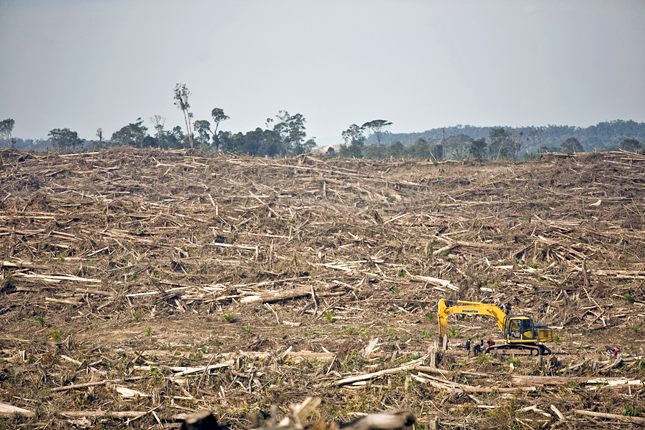-
India’s Thirst for Palm Oil, New South-South Trade Patterns Cast Doubt on Sustainability Initiatives
February 3, 2016 By Philip Schleifer
Patterns of trade and consumption in the global food system are shifting. In the past, most trade in agricultural commodities occurred between developed and developing countries. But, in recent years, the volume of South-to-South trade has increased significantly. Today, some of the most problematic crops in terms of their effect on the environment, such as soy and palm oil, are predominantly traded amongst developing and fast-rising countries.
With a total import volume of 74 million metric tons in 2014, China is now the largest buyer of internationally traded soy by far, and India’s share of the global palm oil trade is estimated to have reached over 20 percent (8.9 million metric tons). This development has further fueled agricultural expansion, deforestation, and biodiversity loss in producer countries, creating a new sustainability crisis in the Global South.
Global markets for agricultural commodities are changing quicklyIn a forthcoming issue of Global Environmental Politics, I explore this trend, its detrimental impact on the environment, and why supply chain-driven initiatives have failed to respond. With a focus on India, I show how these initiatives continue to operate on the basis of a North-to-South trade model, trying to leverage the market power of big-brand companies. However, the effectiveness of this mechanism is undermined by the rise of South-to-South trade and the different structure and institutional context of emerging supply chains.
Not Everyone’s At the Table
Beginning in early 2000s, the World Wide Fund for Nature (WWF) created several roundtable initiatives in key agri commodity sectors, including palm oil, soy, sugarcane, beef, cotton, and biofuels. Unlike organic and fair trade labels, with their focus on niche markets and price premiums, the WWF initiatives were, and still are, mainstream platforms designed to shift the entire sector toward more sustainable practices.
The model was explained in detail by Jason Clay, WWF’s senior vice president of market transformation, in a 2010 TED Talk. According to Clay, 15 key agricultural commodities are responsible for the majority of the sector’s environmental impact. Seventy percent of those commodities are under the control of a limited group of between 300 and 500 companies. Against this background, WWF seeks to engage the top 100 influential companies, which between them control 25 percent of the trade in these commodities, in its roundtable initiatives. In this way, the NGO hopes to significantly reduce the environmental impact of agricultural activity on a global scale.
A similar model has previously been applied in the forestry and fishery sectors, but global markets for agricultural commodities are changing quickly and the worst offenders may no longer be reached through such an approach. The case of the Roundtable on Sustainable Palm Oil (RSPO), a network of more 2,600 producers, processors, traders, manufacturers, and other palm-related organizations, illustrates this well.
Launched in 2002, the RSPO is the oldest and best-established of the roundtable initiatives. Twenty percent of global palm oil production is now certified under its scheme. But my research has revealed that certification uptake through RSPO is almost exclusively driven by demand from Europe. In contrast, in India, now the world’s largest palm oil importer, the RSPO has had almost no market traction at all. In 2013, India imported a total of 8.67 million metric tons of palm oil, of which only 144 tons were RSPO certified (0.0016 percent). This is highly problematic as most of India’s palm oil is sourced from Indonesia, where it is driving the large-scale destruction of the country’s tropical rainforests.
Race Against the Clock
The nature of South-to-South trade and the specific characteristics of these markets explains some of the problem. In the Indian context, two factors are significant.
First, brands only play a minor role. According to a study by the Center for Responsible Business, a New Delhi-based NGO, palm oil in India is sold primarily (89 percent) in unpackaged form and only a very small percentage (11 percent) enters the market in the branded and packaged form.
Second, palm oil in India, also termed “poor man’s cooking oil,” is highly price sensitive. As a result, companies have very small profit margins and consumers are unable to absorb the $30 to $50 price difference between a ton of certified sustainable palm oil and a ton of conventional palm oil.
The key conditions necessary for the RSPO to gain market traction are therefore absent. This might change over time. The market share of branded companies – Indian or foreign – is likely to increase as the country continues on its development path. Also, the growing middle class in India will become increasingly aware of sustainability issues, creating local demand for sustainable palm oil and other agricultural products in the future.
Unfortunately, by then, it might be too late for the rainforests in Sumatra and Borneo, which are vanishing at breathtaking speed. Satellite mapping suggests that Indonesia’s forests – a critical global carbon sink and biodiversity hotspot – are being destroyed at a rate of more than 20,000 km2 a year.
The case of the palm oil illustrates how changing trade and consumption patterns can undermine private sustainability initiatives. Similar processes have been described as occurring in other commodity sectors as well. These findings raise critical questions about supply chain-driven initiatives and their ability to reach the scale necessary to transform global markets.
Philip Schleifer is an assistant professor of transnational governance at the University of Amsterdam.
Sources: Center for Responsible Business, European University Institute, Global Environmental Politics, IndexMundi, Land Use Policy, Roundtable on Sustainable Palm Oil, Science, TED.
Photo Credit: Rainforest clearance for palm oil in Indonesia, courtesy of the Rainforest Action Network. Video: TED.
 A Publication of the Stimson Center.
A Publication of the Stimson Center.



